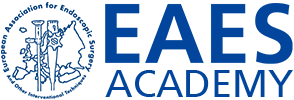Is Laparoscopic Cholecystectomy a Bigger Challenge For a Leftie?! The Perspectives of Four Left Handed Surgical Residents
EAES Academy. Homorogan E. 07/05/22; 363190; P254

Estera Cristina Homorogan
Contributions
Contributions
Abstract
The professional development of left handed surgical residents is a challenge for both the resident and his/her attending. We aim to emphasize the difficulties encountered by left handed surgical residents while performing a laparoscopic cholecystectomy (LC) and find solutions for improving their technique while mainly using their non-dominant hand. We selected four left handed and four right handed surgical residents with similar past experience and knowledge and analyzed their performance in the operating room (OR), each of them performing six LC for chronic, uncomplicated lithiasic cholecystitis. Data analysis showed that third and fourth year left handed resident encountered major difficulties during LC while mainly using non-dominant hand due to poor right hand abilities, undeveloped hand-eye-foot coordination and a lack of appropriate guidance from the attending surgeon. Fifth year left handed residents showed a reduction in the developmental gap between them and right handed colleagues, while no significant differences in performance were reported between sixth year left and right handed surgical residents, both having performed above 50 LCs prior to inclusion in this study. We concluded that left handed surgical residents develop even handed abilities in the course of their training because of their need to adapt to a right handed general setting and attending instructions, while right handed residents tend to disproportionally develop their right handed abilities compared to the non-dominant hand. Although initial challenges are bigger for a leftie, and require additional time, dedication and understanding of their particular situation, results show similar development at the end of their residency program, raising the question if a right handed approach is not all together better suited for a leftie.
The professional development of left handed surgical residents is a challenge for both the resident and his/her attending. We aim to emphasize the difficulties encountered by left handed surgical residents while performing a laparoscopic cholecystectomy (LC) and find solutions for improving their technique while mainly using their non-dominant hand. We selected four left handed and four right handed surgical residents with similar past experience and knowledge and analyzed their performance in the operating room (OR), each of them performing six LC for chronic, uncomplicated lithiasic cholecystitis. Data analysis showed that third and fourth year left handed resident encountered major difficulties during LC while mainly using non-dominant hand due to poor right hand abilities, undeveloped hand-eye-foot coordination and a lack of appropriate guidance from the attending surgeon. Fifth year left handed residents showed a reduction in the developmental gap between them and right handed colleagues, while no significant differences in performance were reported between sixth year left and right handed surgical residents, both having performed above 50 LCs prior to inclusion in this study. We concluded that left handed surgical residents develop even handed abilities in the course of their training because of their need to adapt to a right handed general setting and attending instructions, while right handed residents tend to disproportionally develop their right handed abilities compared to the non-dominant hand. Although initial challenges are bigger for a leftie, and require additional time, dedication and understanding of their particular situation, results show similar development at the end of their residency program, raising the question if a right handed approach is not all together better suited for a leftie.
{{ help_message }}
{{filter}}


